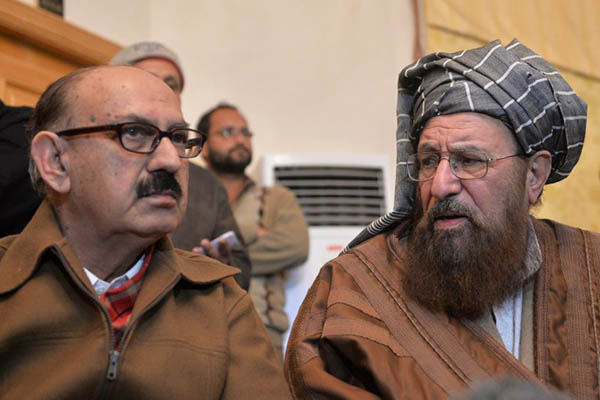
Irfan Siddiqui (left), a member of the government’s team of negotiators, talks to Maulana Sami-ul-Haq of the Pakistani Taliban. Aamir Qureshi—AFP
Observers express concern over whether peace can be assured without the support of all militants groups comprising the TTP coalition.
Negotiators for Pakistan’s government and the Taliban called for a ceasefire after meeting Thursday in the first round of talks aimed at ending the militants’ bloody seven-year insurgency.
The two sides gathered in Islamabad for a preliminary meeting that lasted more than three hours to chart a “roadmap” for future discussions, amid deep skepticism over whether dialogue could yield a lasting peace deal.
Reading from a joint statement following the talks, Maulana Sami-ul-Haq, the Taliban’s chief negotiator, said his side agreed with a government demand that “there should be no activity by either side which can potentially harm the peace efforts.” Irfan Siddiqui, his government counterpart, hailed the meeting—the first ever formal dialogue between the two sides—saying that the Taliban committee had “responded to us beyond our expectations.”
“We are really happy that the Taliban committee has responded to us beyond our expectations and they have heard our reservations and told us their reservations with an open heart,” Siddiqui told reporters on Thursday evening. “We share the common goal of making this country peaceful in accordance with Islamic teaching. And I thank the Taliban committee for meeting us,” Siddiqui added.
Haq said his team would hold discussions with the Taliban leadership and a second round of talks would be held after they had responded.
The Tehreek-e-Taliban Pakistan (TTP) has killed thousands of people in gun and bomb attacks across the nuclear-armed state since it launched its campaign in 2007. The start of the year has seen a surge in militant violence with more than 110 people killed, and an air force bombardment of TTP hideouts in North Waziristan fueled speculation that a major military offensive was imminent.
There is talk of splits within the TTP, a fractious coalition of militant groups, with some rumored to oppose the whole idea of negotiations. Saifullah Khan Mehsud, director of the FATA Research Center, said this made it difficult to achieve even a ceasefire as a first step. “I don’t know if the Taliban are on the same page and which groups that these negotiators are representing, so I don’t know if they can guarantee a ceasefire at all,” he said.
Observers have held out scant hope for the talks, saying there appears to be little common ground and warning of what the government might be forced to concede. One of the TTP’s negotiating team, Maulana Abdul Aziz, said on Wednesday there was no chance of peace unless the government agreed to the imposition of Islamic shariah law throughout Pakistan. The Taliban also want U.S. troops to withdraw from Afghanistan.
The government has insisted that Pakistan’s Constitution must remain paramount, but security analyst Ayesha Siddiqa warned they might find themselves forced to give ground. “I look at history and see that every time the non-religious leadership has tried to do some appeasement Pakistan has slipped deeper into theocracy and this is one such moment,” she said. “We are already a hybrid theocracy and we are heading towards more theocracy.”
